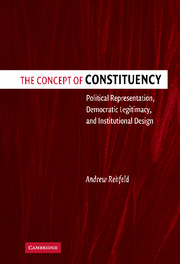 The Concept of Constituency
The Concept of Constituency Published online by Cambridge University Press: 27 July 2009
Democracy is the only form of government that allows people to rule themselves. Ironically, political representation enables modern democracies to exclude virtually everyone from the institutions that govern them. The concept of constituency defines how, in any particular nation, the excluded are legitimately reconstituted prior to, or simultaneously as, they select their representatives who will rule them. The electoral constituency, then, is the quintessential institution of official exclusion, for it defines how it is the excluded get reconstituted for their only formal roles as members of a modern democracy.
Democratic government in its direct or representative form has been around for thousands of years. Yet given the thousands of sovereign cities and states that have laid proper claim to its name, there has been a remarkably small set of institutions by which democracies have actually been governed. Thomas Pogge recently put it this way:
It cannot be said that experience and reflection have produced convergence upon this [set of institutions]. Most of the other possibilities have never been tried or discussed. Indeed, many could not have been tried or discussed because they are becoming feasible only now, in the dawning information age. It is not good reasons that keep practice and reflection within the narrow sector, but habit and entrenchment. We are deeply accustomed to the conventional forms of democracy.
It is likely that our limited exposure to these “conventional forms of democracy” has dulled our imagination of what could be.
To save this book to your Kindle, first ensure no-reply@cambridge.org is added to your Approved Personal Document E-mail List under your Personal Document Settings on the Manage Your Content and Devices page of your Amazon account. Then enter the ‘name’ part of your Kindle email address below. Find out more about saving to your Kindle.
Note you can select to save to either the @free.kindle.com or @kindle.com variations. ‘@free.kindle.com’ emails are free but can only be saved to your device when it is connected to wi-fi. ‘@kindle.com’ emails can be delivered even when you are not connected to wi-fi, but note that service fees apply.
Find out more about the Kindle Personal Document Service.
To save content items to your account, please confirm that you agree to abide by our usage policies. If this is the first time you use this feature, you will be asked to authorise Cambridge Core to connect with your account. Find out more about saving content to Dropbox.
To save content items to your account, please confirm that you agree to abide by our usage policies. If this is the first time you use this feature, you will be asked to authorise Cambridge Core to connect with your account. Find out more about saving content to Google Drive.